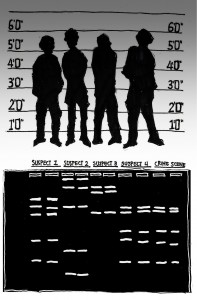DNA testing ban hurts law enforcement
For many years, fingerprinting has been the method used to identify criminals based on past crimes and traces left at previous scenes. Everyone has their fingerprints taken at some point in their life and later stored in a database. This process has long since become outdated with criminals outsmarting the police by wearing gloves to cover their traces.
There is another method, one in which DNA is collected, that proves to be much more efficient. In this method, those that are arrested have their cheeks swabbed and matched with DNA left at other crime scenes that are stored in a database.
If there are any matches, then officers can press further charges. The problem this process faces is that 24 states in the U.S. have laws in place that prevent police from taking DNA samples from those arrested as they see it as a violation of the Fourth Amendment. Collecting DNA that could reveal too many details about a person is considered an “unreasonable search.” They require a conviction to begin collecting DNA, which seems like an incredible step backward in that the process of determining a suspect’s guilt could be done much more quickly if DNA were taken upon arrest.
The database that contains these DNA profiles is known as Combined DNA Index System (CODIS), and it stores the profiles of millions of criminals, as well as DNA records collected at crime scenes. CODIS could be incorrectly interpreted as a huge database that contains too many private details about the genetic and health information about all citizens.
This, however, is not what CODIS is. This program in fact does not contain any DNA profiles, but instead has only 13 genetic markers which have no relationships to any medical or physical traits. These markers are like fingerprints in that they reveal only the identity of a person. CODIS cannot even be hacked as there are no names attached to the set of the 13 DNA markers. Moreover, members of law enforcement themselves have to contact the department that found the profile in order to attach a name to the set of markers. This is just an extra level of security that ensures no one’s private DNA information is hacked.
Many criminals in the states that allow DNA collection have been sent to prison thanks to this process, especially in cases of sexual violence. Suspects that have been arrested and gone through this process have been matched with DNA left at scenes of rape, which has led to conviction of previous crimes that had gone unsolved. For example, a graduate student from New Mexico State University, Katie Sepich, was raped in 2003 and her body was burned and dumped nearby. The case had gone unsolved for years until in 2006, when the DNA found underneath her fingernails matched the DNA left at sites of more recent rapes, connecting the DNA to a killer that had gone free for several years.
DNA collection is the new form of fingerprinting, and in the 21st century, it is the most modern and convenient form of matching identities. Due to the ambiguity provided by only 13 genetic markers being collected which provide no information other than identity, there is nothing to be feared from the simple process of a cheek swab. The ban that certain states have placed on DNA collection only takes us steps backwards in catching and convicting criminals.
Ayesha Misra is a junior majoring in psychology.
Follow Daily Trojan on Twitter @dailytrojan


This article makes no comment about recent Supreme Court cases which question he constitutionality of DNA collection at the time of arrest. Additionally, if a minority of the states allow this sort of DNA collection, I don’t think anyone would characterize it as a “ban.”